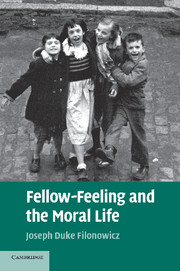Book contents
- Frontmatter
- Contents
- Preface
- Chapter 1 Fellow-feeling and ethical theory: the British sentimentalists
- Chapter 2 Ethical sentimentalism revisited
- Chapter 3 Shaftesbury's ethical system
- Chapter 4 Hutcheson's moral sense
- Chapter 5 What do we perceive by moral sense?
- Chapter 6 C. D. Broad's defense of moral sense theories in ethics
- Chapter 7 What is innate in moral sense?
- Bibliography
- Index
Chapter 3 - Shaftesbury's ethical system
Published online by Cambridge University Press: 22 September 2009
- Frontmatter
- Contents
- Preface
- Chapter 1 Fellow-feeling and ethical theory: the British sentimentalists
- Chapter 2 Ethical sentimentalism revisited
- Chapter 3 Shaftesbury's ethical system
- Chapter 4 Hutcheson's moral sense
- Chapter 5 What do we perceive by moral sense?
- Chapter 6 C. D. Broad's defense of moral sense theories in ethics
- Chapter 7 What is innate in moral sense?
- Bibliography
- Index
Summary
SHAFTESBURY AS MORALIST
Anthony Ashley Cooper, Third Earl of Shaftesbury (1671–1713) was, on my account of sentimentalism, its true founder. In order to justify this claim fully I propose to reconsider Shaftesbury's ethical philosophy and re-evaluate its importance in the history of ethics. But first we need to understand what his ethical philosophy is, and that is the aim of the present chapter. Shaftesbury ought to be of interest to both historians of ideas and philosophers of ethics, first because so many writers (past and present) seem so very ambivalent towards him and his achievements, and second because no one seems to have explained clearly what exactly he was saying about ethics.
Regarding the first point, nobody denies that his Characteristics was a seminal work in early modern philosophy. But Shaftesbury's reputation as a forward-looking Augustan moralist is overshadowed by his reputation as a moralist, period – as a contributor to the subject of ethics in a spirit of philosophia perennis. On that score he is widely regarded as a second-rate thinker at best, by nearly all leading twentieth-century commentators. (It is too soon to tell about the twenty-first.) The incongruity between the two reputations is very strange; there is nothing like it at work in our judgments of any of the other leading British Moralists.
- Type
- Chapter
- Information
- Fellow-Feeling and the Moral Life , pp. 65 - 103Publisher: Cambridge University PressPrint publication year: 2008



